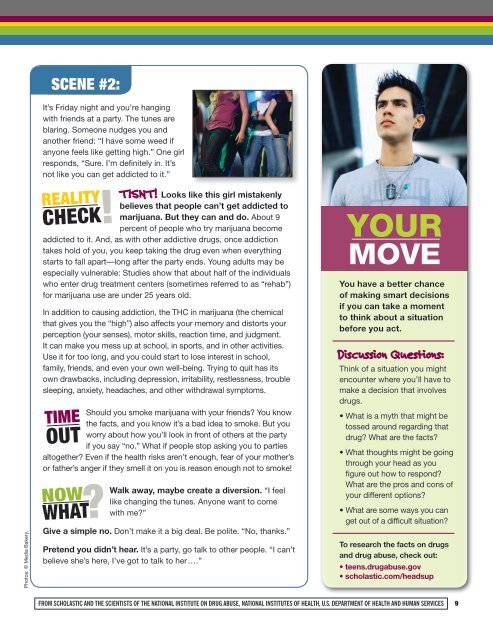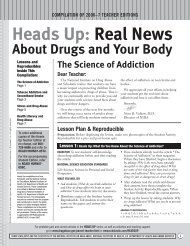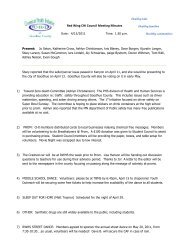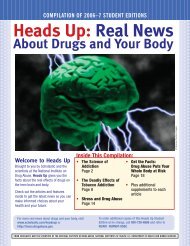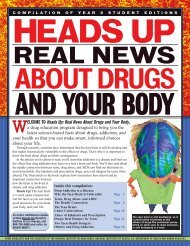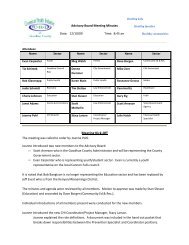Heads Up: Real News About Drugsand Your Body - Scholastic
Heads Up: Real News About Drugsand Your Body - Scholastic
Heads Up: Real News About Drugsand Your Body - Scholastic
Create successful ePaper yourself
Turn your PDF publications into a flip-book with our unique Google optimized e-Paper software.
Scene #2:<br />
Photos: © Media Bakery.<br />
It’s Friday night and you’re hanging<br />
with friends at a party. The tunes are<br />
blaring. Someone nudges you and<br />
another friend: “I have some weed if<br />
anyone feels like getting high.” One girl<br />
responds, “Sure. I’m definitely in. It’s<br />
not like you can get addicted to it.”<br />
TISNT! Looks like this girl mistakenly<br />
believes that people can’t get addicted to<br />
marijuana. But they can and do. <strong>About</strong> 9<br />
percent of people who try marijuana become<br />
addicted to it. And, as with other addictive drugs, once addiction<br />
takes hold of you, you keep taking the drug even when everything<br />
starts to fall apart—long after the party ends. Young adults may be<br />
especially vulnerable: Studies show that about half of the individuals<br />
who enter drug treatment centers (sometimes referred to as “rehab”)<br />
for marijuana use are under 25 years old.<br />
REALITY<br />
CHECK<br />
TIME<br />
OUT<br />
NOW<br />
WHAT<br />
?<br />
!<br />
In addition to causing addiction, the THC in marijuana (the chemical<br />
that gives you the “high”) also affects your memory and distorts your<br />
perception (your senses), motor skills, reaction time, and judgment.<br />
It can make you mess up at school, in sports, and in other activities.<br />
Use it for too long, and you could start to lose interest in school,<br />
family, friends, and even your own well-being. Trying to quit has its<br />
own drawbacks, including depression, irritability, restlessness, trouble<br />
sleeping, anxiety, headaches, and other withdrawal symptoms.<br />
Should you smoke marijuana with your friends? You know<br />
the facts, and you know it’s a bad idea to smoke. But you<br />
worry about how you’ll look in front of others at the party<br />
if you say “no.” What if people stop asking you to parties<br />
altogether? Even if the health risks aren’t enough, fear of your mother’s<br />
or father’s anger if they smell it on you is reason enough not to smoke!<br />
Walk away, maybe create a diversion. “I feel<br />
like changing the tunes. Anyone want to come<br />
with me?”<br />
Give a simple no. Don’t make it a big deal. Be polite. “No, thanks.”<br />
Pretend you didn’t hear. It’s a party, go talk to other people. “I can’t<br />
believe she’s here, I’ve got to talk to her .…”<br />
<strong>Your</strong><br />
Move<br />
You have a better chance<br />
of making smart decisions<br />
if you can take a moment<br />
to think about a situation<br />
before you act.<br />
Discussion Questions:<br />
Think of a situation you might<br />
encounter where you’ll have to<br />
make a decision that involves<br />
drugs.<br />
• What is a myth that might be<br />
tossed around regarding that<br />
drug? What are the facts?<br />
• What thoughts might be going<br />
through your head as you<br />
figure out how to respond?<br />
What are the pros and cons of<br />
your different options?<br />
• What are some ways you can<br />
get out of a difficult situation?<br />
To research the facts on drugs<br />
and drug abuse, check out:<br />
• teens.drugabuse.gov<br />
• scholastic.com/headsup<br />
FROM SCHOLASTIC AND THE SCIENTISTS OF THE NATIONAL INSTITUTE ON DRUG ABUSE, NATIONAL INSTITUTES OF HEALTH, U.S. DEPARTMENT OF HEALTH AND HUMAN SERVICES 9


